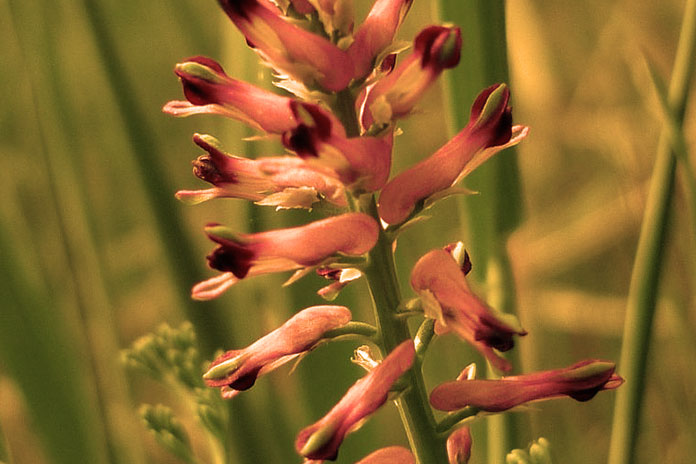Fumitory is a medicinal plant mainly used to regulate bile flow and treat disorders related to liver and biliary tract problems.
Fumitory, Plant, And Habitat
The fumitory ( Fumaria officinalis ) is an annual and spontaneous herbaceous plant that belongs to the Fumariaceae family. It has a glabrous and branched stem that can reach about twenty centimeters and bears alternate, bi-tripennate seven leaves. The flowers develop in spring, gathered in raceme inflorescences and pink or white, with purplish hues.
The fruit that is produced after flowering is a nut. The flue is a weed found in all temperate climate zones along roadsides, fields, and meadows. This plant has been used since ancient times for therapeutic purposes, above all, for its action on the bile ducts and liver. So, let’s see what it contains, what the flu is for, and how to use it.
Parts Used And Chemical Constituents
The aerial parts collected from the flue are used when the plant is in flower, i.e., in spring. Fumitory leaves and flowers mainly contain alkaloids, flavonoids, bitter principles, mucilage, and mineral salts. The alkaloids of the flu are represented by various substances, including protropin (or fumarin), fumaritin, fumarilin, synactin, etc. The plant has a salty and bitter taste, and its name refers to the smell of the rubbed leaves, reminiscent of smoke and soot.
Properties Of The Flue In Herbal Medicine
The fumitory is an herbal remedy with the following properties:
- Ampho Choleretic (regulators of bile flow)
- Purifying
- Diuretics
- Spasmolytic
Protopin or fumarin also has anticholinergic, antibacterial, and antiarrhythmic action. The properties of the flue are used to treat mild liver insufficiency, prevent arteriosclerosis, and in case of skin problems such as eczema, acne, and psoriasis.
Also Read: The Role Of Legumes In Nutrition: Properties, Nutritional Values
Use Of The Flu
The Flue Is Used In The Form Of
- Infusion
- Mother tincture
- Dry or fluid extract
The herbal tea is prepared with the dried drug and extracts, while the fumitory mother tincture is obtained by maceration of the fresh plant in alcohol and water. Fumitory preparations are mainly used for liver well-being and symptoms associated with bile flow disturbances. The flu is also used to reduce salivary secretion induced by some drugs in dermatitis, acne, and psoriasis and as a preventive remedy for arteriosclerosis.
Examples Of Use Of This Plant
- Body purification: 15 drops of mother tincture of fumitory (TM) diluted in water, to be taken twice a day before meals for a month;
- Difficult digestion, meteorism, and halitosis: 30 drops of TM diluted in water, to be taken twice a day for two months;
- Prevention of arteriosclerosis: 30 drops of TM dilute water, to be taken twice daily for two months. Repeat the cycle two or three times a year;
- Arthritis: two capsules of dry extract (250 mg per capsule) twice daily for two months.
- Acne and skin problems: Take the fumitory infusion twice or thrice daily for two months.
Fumitory For Liver Health
The fumitory is an amph choleretic remedy, i.e., capable of stimulating or reducing the bile flow, depending on whether this is insufficient or in excess. It is, therefore, used for disorders of the liver and biliary tract to treat symptoms associated with them, such as:
- Liver migraines
- Nausea
- Dizziness
- The sense of heaviness
- Spasms of the gallbladder and bile ducts
- Asthenia
- Inappetence and anorexia in liver cirrhosis.
The action of the flu on the liver and biliary tract is attributed to the presence of alkaloids, particularly the alkaloid protopine. For liver health, the flu can be associated with other plants that act on the liver or as purifiers, such as artichoke and dandelion. Since it acts on the liver, flue gas is sometimes recommended for weight loss.
This is because the liver is an organ involved, among other things, in the metabolism of fats. If the liver works poorly, fat metabolism could undergo alterations with fat accumulation both in the liver itself and in the adipose tissue. As a result, a poorly functioning liver can lead to weight gain or difficulty losing weight. In these cases, remedies capable of supporting the function of the liver and bile ducts are recommended, such as the flu.
Contraindications And Drug Interactions
Fumitory is a well-tolerated plant with no side effects if the recommended dosages are respected and in the absence of individual sensitivity. However, the use of fumitory is contraindicated during pregnancy and breastfeeding, and the plant can interact with sedative and hypotensive drugs, increasing their effects.
Fumitory Herbal Tea
Fumitory herbal tea is prepared with dried drugs, whole or broken up, and infused in hot water for five minutes. The daily dosage is 6 grams, divided into two to three daily doses. The infusion is drunk before main meals, generally before breakfast, lunch, and dinner.
Also Read: Propolis: Benefits And Properties Of The Health Elixir Produced By Bees


